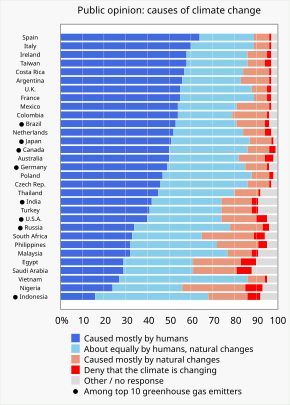
Back الرأي العام حول الاحتباس الحراري Arabic জলবায়ু পরিবর্তন সম্পর্কে জনমত Bengali/Bangla Δημόσια γνώμη για την κλιματική αλλαγή Greek باور همگانی درباره تغییر اقلیم Persian د اقلیمي بدلونونو اړوند عامه لیدلوری Pashto/Pushto Dư luận về biến đổi khí hậu Vietnamese


Public opinion on climate change is related to a broad set of variables, including the effects of sociodemographic, political, cultural, economic, and environmental factors[3] as well as media coverage[4] and interaction with different news and social media.[5] International public opinion on climate change shows a majority viewing the crisis as an emergency.
Public opinion polling is an important part of studying climate communication and how to improve climate action, evidence of public opinion can help increase commitment to act by decision makers.[6] Surveys and polling to assess opinion have been done since the 1980s, first focusing on awareness, but gradually including greater detail about commitments to climate action. More recently, global surveys give much finer data, for example, in January 2021, the United Nations Development Programme published the results of The Peoples' Climate Vote. This was the largest-ever climate survey, with responses from 1.2 million people in 50 countries, which indicated that 64% of respondents considered climate change to be an emergency, with forest and land conservation being the most popular solutions.[7]
- ^ Leiserowitz, A.; Carman, J.; Buttermore, N.; Wang, X.; et al. (June 2021). International Public Opinion on Climate Change (PDF). New Haven, CT, U.S.: Yale Program on Climate Change Communication and Facebook Data for Good. p. 7. Archived (PDF) from the original on 28 June 2021.
- ^ ● Survey results from: "The Peoples' Climate Vote". UNDP.org. United Nations Development Programme. 26 January 2021. Archived from the original on 28 January 2021. Fig. 3.
● Data re top emitters from: "Historical GHG Emissions / Global Historical Emissions". ClimateWatchData.org. Climate Watch. 2021. Archived from the original on 21 May 2021. - ^ Shwom, Rachael; McCright, Aaron; Brechin, Steven; Dunlap, Riley; Marquart-Pyatt, Sandra; Hamilton, Lawrence (October 2015). "Public Opinion on Climate Change". Climate Change and Society. pp. 269–299. doi:10.1093/acprof:oso/9780199356102.003.0009. ISBN 978-0-19-935610-2. Retrieved 15 June 2021.
- ^ Antilla, Liisa (1 March 2010). "Self-censorship and science: a geographical review of media coverage of climate tipping points". Public Understanding of Science. 19 (2): 240–256. doi:10.1177/0963662508094099. ISSN 0963-6625. S2CID 143093512.
- ^ Cite error: The named reference
Diehl-2019was invoked but never defined (see the help page). - ^ "The Peoples' Climate Vote". UNDP.org. United Nations Development Programme. 26 January 2021. Archived from the original on 28 January 2021.
64% of people said that climate change was an emergency – presenting a clear and convincing call for decision-makers to step up on ambition.
- The highest level of support was in SIDS (Small Island Developing States, 74%), followed by high-income countries (72%), middle-income countries (62%), then LDCs (Least Developed Countries, 58%).
- Regionally, the proportion of people who said climate change is a global emergency had a high level of support everywhere - in Western Europe and North America (72%), Eastern Europe and Central Asia (65%), Arab States (64%), Latin America and Caribbean (63%), Asia and Pacific (63%), and Sub-Saharan Africa (61%).
- Four climate policies emerged as the most popular globally:
1. Conservation of forests and land (54% public support);
2. Solar, wind and renewable power (53%);
3. Climate-friendly farming techniques (52%); and
4. Investing more in green businesses and jobs (50%).
(Page has download link to 68-page PDF.) - ^ McGrath, Matt (27 January 2021). "Climate change: Biggest global poll supports 'global emergency'". BBC. Retrieved 27 January 2021.